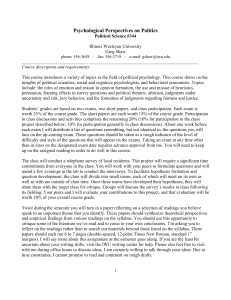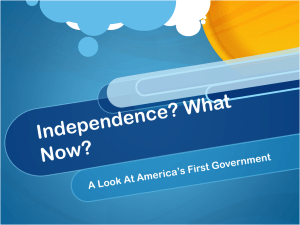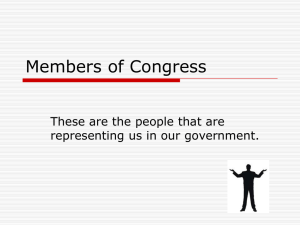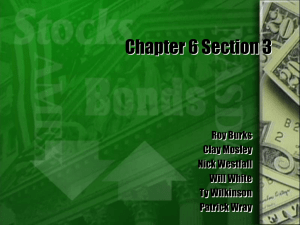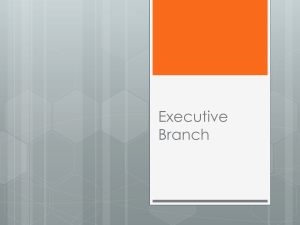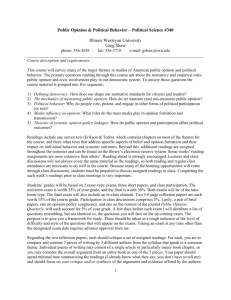341-Congress and the Legislative Process Syllabus
advertisement
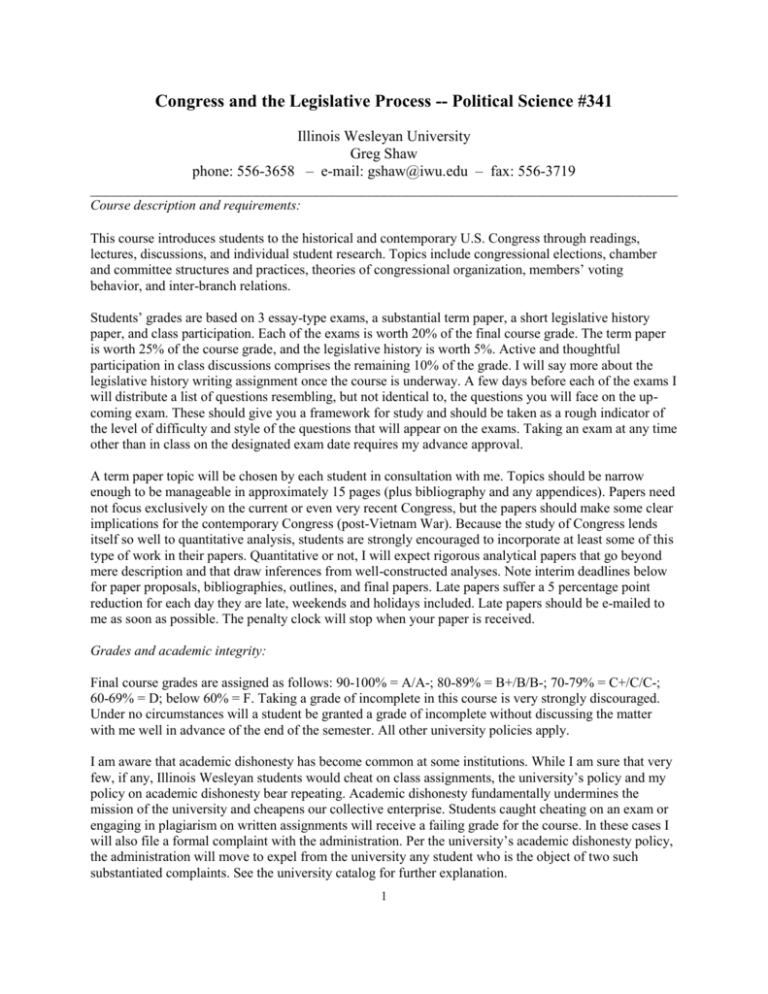
Congress and the Legislative Process -- Political Science #341 Illinois Wesleyan University Greg Shaw phone: 556-3658 – e-mail: gshaw@iwu.edu – fax: 556-3719 ______________________________________________________________________________ Course description and requirements: This course introduces students to the historical and contemporary U.S. Congress through readings, lectures, discussions, and individual student research. Topics include congressional elections, chamber and committee structures and practices, theories of congressional organization, members’ voting behavior, and inter-branch relations. Students’ grades are based on 3 essay-type exams, a substantial term paper, a short legislative history paper, and class participation. Each of the exams is worth 20% of the final course grade. The term paper is worth 25% of the course grade, and the legislative history is worth 5%. Active and thoughtful participation in class discussions comprises the remaining 10% of the grade. I will say more about the legislative history writing assignment once the course is underway. A few days before each of the exams I will distribute a list of questions resembling, but not identical to, the questions you will face on the upcoming exam. These should give you a framework for study and should be taken as a rough indicator of the level of difficulty and style of the questions that will appear on the exams. Taking an exam at any time other than in class on the designated exam date requires my advance approval. A term paper topic will be chosen by each student in consultation with me. Topics should be narrow enough to be manageable in approximately 15 pages (plus bibliography and any appendices). Papers need not focus exclusively on the current or even very recent Congress, but the papers should make some clear implications for the contemporary Congress (post-Vietnam War). Because the study of Congress lends itself so well to quantitative analysis, students are strongly encouraged to incorporate at least some of this type of work in their papers. Quantitative or not, I will expect rigorous analytical papers that go beyond mere description and that draw inferences from well-constructed analyses. Note interim deadlines below for paper proposals, bibliographies, outlines, and final papers. Late papers suffer a 5 percentage point reduction for each day they are late, weekends and holidays included. Late papers should be e-mailed to me as soon as possible. The penalty clock will stop when your paper is received. Grades and academic integrity: Final course grades are assigned as follows: 90-100% = A/A-; 80-89% = B+/B/B-; 70-79% = C+/C/C-; 60-69% = D; below 60% = F. Taking a grade of incomplete in this course is very strongly discouraged. Under no circumstances will a student be granted a grade of incomplete without discussing the matter with me well in advance of the end of the semester. All other university policies apply. I am aware that academic dishonesty has become common at some institutions. While I am sure that very few, if any, Illinois Wesleyan students would cheat on class assignments, the university’s policy and my policy on academic dishonesty bear repeating. Academic dishonesty fundamentally undermines the mission of the university and cheapens our collective enterprise. Students caught cheating on an exam or engaging in plagiarism on written assignments will receive a failing grade for the course. In these cases I will also file a formal complaint with the administration. Per the university’s academic dishonesty policy, the administration will move to expel from the university any student who is the object of two such substantiated complaints. See the university catalog for further explanation. 1 Readings: The following books are required reading: Congress Reconsidered, 9th edition, Lawrence Dodd and Bruce Oppenheimer (CQ Press, 2009) Committees in Congress, 3rd edition, Christopher Deering and Steven Smith (CQ Press, 1997) House and Senate, 3rd edition, Ross Baker (W.W. Norton, 2008) Congress: The Electoral Connection, David Mayhew (Yale Univ. Press, 1974) [not at IWU bookstore] Excerpts from the following readings are available in the library’s reserve collection (electronic unless otherwise indicated; password = pelosi): Gary Cox and Mathew McCubbins, Legislative Leviathan: Party Government in the House (Univ. of California Press, 1993) Keith Krehbiel, Information and Legislative Organization (Univ. of Michigan Press, 1991) John Kingdon, “Models of Legislative Voting,” in Classics in Congressional Politics (Addison-WesleyLongman Publishers, 1999) Poole and Rosenthal, Congress: A Political-Economic History of Roll Call Voting, (Oxford University Press, 1997) Three essays (Matland & King, Swers, and Walsh) are taken from Women Transforming Congress, edited by Cindy Rosenthal (Univ. of Oklahoma Press, 2002) Richard Fenno, Going Home: Black Representatives and Their Constituents (Univ. of Chicago Press, 2003) Nelson Polsby, How Congress Evolves (Oxford Univ. Press, 2004) Louis Fisher, Constitutional Conflicts between Congress and the President, 4th edition (Univ. of Kansas Press, 1997) John Yoo, The Powers of War and Peace (Univ. of Chicago Press, 2005) Arthur Schlesinger, Jr., The Imperial Presidency (Houghton Mifflin Co., 1973) 2 ____________________________________________________________________________ Topics Week of: Readings Introduction and course overview Baker, chapts. 1 & 2 The founding and the early Congress Dodd & Oppenheimer, chapts. 2, 3, 16 Congressional elections, Pt. 1 Dodd & Oppenheimer, chapts. 4 & 5 Baker, chapt. 4 Matland and King essay: “Women as Candidates…” Congressional elections, Pt. 2 Dodd & Oppenheimer, chapt. 6 Nuts and bolts of the contemporary Senate and House of Representatives Paper proposals due in class on Tuesday Legislative history due in class on Thursday Dodd & Oppenheimer, chapts. 1 & 9 Committees First exam: (covering all material to date) Deering & Smith, chapts. 1-3, 5 Dodd & Oppenheimer, chapt. 10 Research methods overview/refresher (Tuesday) and term paper progress reports (Thursday) none Theories of congressional organization, Pt. 1 - Distributive politics Mayhew part 1 & pages 81-158 of part 2 (also on traditional reserve) Annotated bibliographies due in class Theories of congressional organization, Pt. 2 - Partisan politics - Informational politics Cox & McCubbins intro., chapts. 1, 2, 6, 7, 9 & conclusion (traditional reserve) Krehbiel chapts. 1-3, 7 (traditional reserve) Congress in an era of heightened partisanship Dodd & Oppenheimer, chapts. 7, 8, 17 Baker, chapt. 3 Polsby, chapt. 4 Congress members’ voting behavior Kingdon article 3 - Floor votes Poole & Rosenthal, Congress, ch. 1-3 Fisher, chapt. 9: “The War Power” Yoo, chapt. 5: “War Powers for a New Congressional-executive relations, Pt. 1 - Executive vetoes - Oversight - War making World” (skim after p. 160) Schlesinger, chapts. 1 & 2 Dodd & Oppenheimer, chapt. 14 Paper outline and literature review due in class on Tuesday Second exam: (covering all material presented since the 1st exam) Congressional-executive relations, Pt. 2 - Divided government - Legislative short-cuts Congress and the courts Baker, chapt. 7 Dodd & Oppenheimer, chapts. 11 & 13 Policymaking in Congress Dodd & Oppenheimer, chapt. 15 Representation in Congress Fenno, Going Home, chapt. 6 Swers essay: “Transforming the Agenda” Walsh essay: “Enlarging Representation” Summing up Review for final exam Papers due in class Thursday the 3rd of December Dodd & Oppenheimer, chapt. 18 Baker, chapt. 6 Final exam: comprehensive 4



